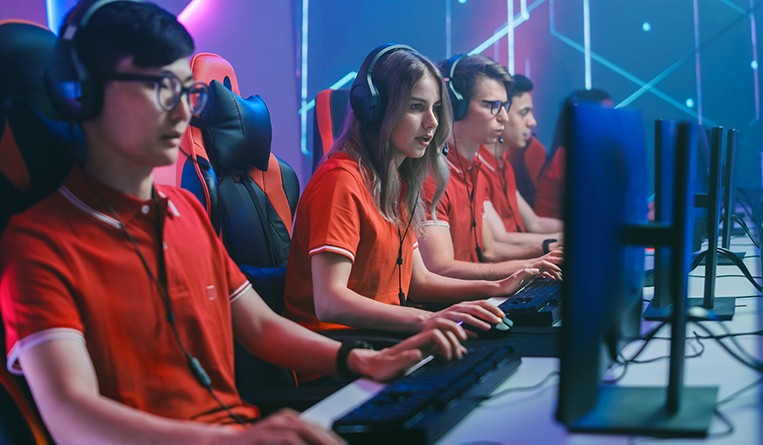Video games, eSports and gambling: An IP practitioner’s perspective on the opportunities and limits
29 February 2024

IP is the core of the video game and eSports industry, but other legal disciplines such as contract law and gambling law also play important roles in regulating the industry. Meryl Koh and Justin Lai from Singapore law firm Drew & Napier examine the evolution of the industry and the challenges it faces, from copyright and trademark infringement in the VR and AR era to the IP implications with regards to using AI in game creation.
It has been said that the very first video game was invented in 1958 by physicist William Higinbotham. This was a simple tennis game built for an exhibition to entertain exhibitiongoers and showcase the relevance of science to society. Fast forward 50 years, the emergence of various gaming platforms like the arcade, home console, PC and handheld device have led to a booming video game industry, now bigger than the movie and music industries put together, according to Investopedia. Coupled with the accessibility of mobile gaming and the development of new gaming technologies, the industry is predicted to generate a revenue of US$282.30 billion in 2024; this number is projected to grow at an annual rate of 8.76 percent, according to Statista.
With the proliferation of video games and the development of the video game industry came the worldwide phenomenon of competitive gaming as a form of spectator sport. Known as eSports, video gaming tournaments have been gaining popularity since the 2000s, and this rapidly growing market is expected to gather more than 532 million viewers worldwide and generate more than US$1.6 billion in revenue by 2024.
With statistics suggesting that there are over 3.22 billion gamers globally, according to Grand View Research, video games have been cemented as a popular form of entertainment. However, success is never without its challenges. With numerous industry stakeholders vying for consumer attention and a market share, commercial and legal conflicts are inevitable. This article seeks to provide an overview on how intellectual property and gambling laws may apply to the video game industry, and briefly discuss trending issues such as video game cloning, eSports contracts, and online gambling.
Protecting IP
To protect such a lucrative industry, valuable gaming assets and creative works must be safeguarded. IP laws play a vital role in granting IP owners exclusive rights to extract value from their creations and to defend against infringement of their work. These assets may be generally protected in a number of ways.
First, video games comprise different components such as music, art, plot, and source code, all of which are the game’s assets. Many of these assets are, in principle, protectable under copyright law. Further, as copyrights subsist independently of one another, each individual asset may have its own copyright (or, indeed, multiple copyrights). (Copyright Act 2021, §107). Subject to nuances of national copyright legislation, copyright protection is typically conferred automatically once the work is created, and in most jurisdictions, no registration is required.
Second, identifying signs or indicia such as video game titles, eSports team names and logos, and gamer tags may be protected under trademark law and/or the common law tort of passing off (to the extent that existing goodwill is associated with that sign or indicia). These two regimes operate to prevent consumer confusion, protecting traders against imitation/impersonation by others seeking to free ride on the strength of their brands or the goodwill they have painstakingly acquired.
Third, novel and inventive gameplay mechanics can in principle be protected under patent law. For example, Bioware patented the dialogue choice wheel in Mass Effect,which allows players to select from different responses on a wheel interface. Warner Brothers patented the Nemesis system in Shadows of Mordor,which generates in-game villains who respond dynamically to the player’s gameplay thus influencing the game’s later narrative.
A common theme is that, once crystallized, these IP rights generally grant their owner/proprietor the right to sue others to prevent unauthorized use or exploitation. Further, IP rights are generally regarded as personal property, meaning that they may be sold, assigned, licensed, or mortgaged. Therefore, IP rights have immense value – they are often the product of significant investments in time, effort, and money, representing developments in the areas of art, science, and commerce. Having, acquiring or even obtaining a licence of IP rights can be a key factor leading to the success of one’s business endeavour whereas lacking or infringing upon them can spell disaster.
Video game cloning
It is not easy to develop a video game, let alone one that achieves widespread popularity or commercial success. With successful video games being so profitable, it is no surprise that there will be other game developers who want to piggyback off existing cult-favourites and capitalize on their success by creating similar games. These games which are influenced or inspired by popular game concepts or have expanded on popular game mechanics may in some cases, be acceptable since ideas and gameplay are generally not protected by copyright. However, clones / copycats can sometimes stray into copyright infringement territory if the creative aspects of the popular game are copied.
In 2018, Riot Games’ parent company sued Moonton’s CEO in China for copyright infringement for developing a game called Mobile Legends,alleged to be a “straight lift” of League of Legends(LoL). The Chinese Court eventually ordered Moonton’s CEO to pay damages worth US$2.9 million.
In 2022, Riot Games sued NetEase for copyright infringement and/or passing off in multiple jurisdictions for developing a game called Hyper Front,alleged to be a clone of Valorant. Riot claimed that Hyper Front copied with minor cosmetic modifications all their creative choices such as the character designs, maps, and weapons. NetEase eventually shut down Hyper Front’s servers in April 2023.
More recently, public forums were debating whether Palworld is a Pokémon clone. Pals in Palworld are caught by throwing balls at them and there is much commentary about the Pals bearing visual similarities to Pokémon character designs. Other than that, it is also argued that there are still, numerous differences in gameplay.
The question remains: Is there copyright infringement? First, the concept and idea behind catching cartoon monsters are not in and of themselves copyrightable. This is because copyright only protects expressions in tangible form and not ideas per se. Further, in jurisdictions such as Singapore, the extent of copyright protection over modern-day video games has yet to be conclusively determined. Second, for there to be copyright infringement, a qualitatively substantial amount of the original work must have been copied. While Pals may have some similar stylistic designs to Pokémon, both can be said to draw some inspiration from real-world animals such that it could be argued that copying was not involved or that the threshold of substantial copying has not been crossed.
These issues (and more) mean that actions to enforce IP rights in video games are usually less straightforward than they may first appear. Game developers who are looking to create games inspired by or building upon popular games must be careful not to directly copy copyrighted elements. If there are substantial similarities between the developing game and the original game, developers should seek legal advice to see if these parts will be considered infringing and/or if any exceptions (such as fair use) apply to them. Should developers want to use copyrighted material, they can consider acquiring the necessary licences. It is also important to note that copyright is territorial in nature, so it is always prudent to approach local counsel for advice on copyright protection and infringement.
eSports content, contracts and commercial deals
eSports is invariably built upon IP held by game developers/publishers. As games contain significant amounts of copyrighted and/or trademarked material, event organizers who host commercial eSports tournaments using those games will likely have to do so under licence from the game developers/publishers and the relevant IP owners. Failure to do so may expose the event organizers to claims of IP infringement.
A unique situation arises when one party owns the game content rights and another party owns the rights to player-generated gaming content. In 2015, a Twitch channel called “SpectateFaker” dedicated itself to streaming games of a well-known LoL player “Faker”. Streaming platform Azubu who then held the exclusive rights to stream Faker’s games sent Twitch a DMCA takedown notice and Twitch complied. However, SpectateFaker was streaming his spectator view of the games from a third-party client and not streaming content directly from Azubu. Riot, the developer and publisher of LoL, thus asserted that as they owned the IP rights to LoL, Azubu did not possess the legal rights to issue the takedown. Nevertheless, Riot recognized that the stream could harm Faker’s brand and subsequently issued a policy allowing players to file takedown claims if they believe a stream is “harming” them.
A significant amount of revenue generated by the eSports industry comes from sponsorship and advertising. Besides the usual sale of physical licensed merchandises, sponsors and advertisers also market heavily in the digital realm. For example, Louis Vuitton partnered with Riot for the 2019 LoL World Championship to design skins (i.e. in-game cosmetic features) and outfits for specific LoL characters in-game. Burger King and Mountain Dew also collaborated with Call of Duty to produce limited-time skins. This presents a great opportunity for sponsors and advertisers to gain extra revenue while increasing brand exposure by incorporating their trademark onto such digital assets. However, eSports teams must be careful not to commercialize in-game merchandise with registered trademarks without permission as there could be a case for trademark infringement.
The line between online gambling and gaming
Singapore introduced the Gambling Control Act (GCA) and established the Gambling Regulatory Authority (GRA) in 2022 to regulate gambling activities and penalize unlawful gambling offences in Singapore. Under the GCA, “gambling” is defined as the act of betting, playing a game of chance and participating in a lottery. (GCA §4) Only social gambling, gambling with licensed operators and jackpot gambling in private clubs are allowed. Online gambling is currently prohibited in Singapore unless licensed or exempted. The GRA has powers by virtue of the GCA to block access to online remote gambling locations, to block payment transactions (GCA Part 9, Division 4) and to ban individuals from gambling online (GCA §79).
Like traditional betting, betting on eSports games is illegal in Singapore as the betting still involves a game of chance (GCA §5). It involves staking items of value on a competition outcome hoping for the chance to win something else of value. There is less clarity surrounding the legality of “skin betting” (i.e. using virtual goods as virtual currency to place stakes and bet on potential outcomes of sports matches or other games of chance). Skins can be traded on online marketplaces and can hold real-world value, thus skin betting can be akin to betting with real money. However, this remains relatively less regulated.
Video games themselves, from the players’ perspective, are skill-based so they are generally excluded from regulation under the GCA. However, this line blurs when video games introduce features with gambling mechanics like loot boxes (i.e. virtual item that contain other randomized selection of virtual items) and gacha (i.e. toy typically sold in plastic capsules, from vending machines), which are chance-based. The former are mystery boxes containing unknown virtual items that players can purchase in game with in-game currency or real-world money. The latter shares a similar mechanic where players “roll” for a randomized item. As the chances of getting something valuable are randomized, these features have been compared to gambling.
The question then is whether and to what extent gambling laws should apply to video games. In Singapore, loot boxes and gacha would generally not be caught under the GCA as the player does not win any money or items with real-world value. (GCA §§7 and 9) However, once the virtual item is exchanged for real-world payouts, it could be considered gambling.
Scanning commentary on this issue from the perspective of other jurisdictions, it appears that contrary to Singapore, Macau permits online casino gaming, betting, and lottery (except horse racing/sports betting) as there are no laws or regulations governing online gambling. The UK also allows eSports betting provided that operators hold a gambling licence. Like Singapore, most countries do not licence skin betting and some deem it illegal, however Isle of Man is the first jurisdiction to licence and legitimize skin betting. Many countries also do not actively regulate or ban loot boxes and gacha. Well-known exceptions being Belgium, which has taken a strict stance on banning loot boxes and Japan, which has banned “complete gacha”.
Conclusion
IP is the core of the video game and eSports industry. Without IP laws, anyone will be able to profit off successful IP without putting in the hard work, thus disincentivizing innovation and original creations within the industry. However, a fine balance must be struck between protecting private commercialization interests, promoting creativity and innovation as well as benefiting society.
Other legal disciplines such as contract law and gambling law also have a role to play in regulating the industry. Industry stakeholders must be aware of their obligations and liabilities under such laws, and compliance is key to smooth operations and a thriving business. However, some areas still lack proper supervision and with the industry growing bigger, it is only fitting that attention be placed on establishing an overriding governing authority and formulating overarching legislation.
Finally, one must also be clued into the new challenges which surround the protection of IP. Will there be copyright or trademark infringement when copyrighted works and registered trademarks are used in virtual reality and augmented reality games, or will the fair use defence apply? Can eSports players protect their in-game brand by taking steps to protect the design of their virtual avatars? What are the IP implications with regards to using AI in game creation, for example when game assets are generated using copyrighted material? These are some of the questions which demonstrate the complex interplay between the industry and IP laws. Industry stakeholders are always invited to seek legal advice to help them navigate the complicated legal terrain.









